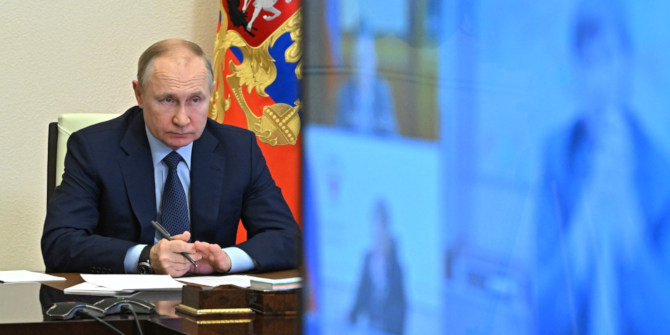Brexit was largely absent from the UK’s general election campaign. John S. F. Wright draws on lessons from Star Trek to explain why Britain’s political leaders are now so reluctant to talk about the subject.
Brexit has failed. But no one wants to talk about it. The day before the 2024 UK general election, 61-year-old Labour Leader, Keir Starmer, ruled out Britain rejoining the EU single market in his lifetime. Earlier in June, his Shadow Chancellor, Rachel Reeves, told journalists that there would be no restoration of freedom of movement, no special deals on youth mobility, no going back to the EU customs union. It’s a little odd. Because everybody can see that Brexit has failed, even the Brexiteers.
A new frontier
So why don’t British political leaders want to talk about Brexit? It’s because they don’t know how. They have forgotten about its connection to the idealism of the 1960s. Harold Macmillan and Ted Heath, by contrast, knew how to talk about Europe. Conceiving that membership of the European community was “a new frontier” for Britain, they connected the country with the idealism of their era, which also found expression in classic television series of the time.
Speaking to the Democratic National Convention in July 1960, Presidential Nominee John F. Kennedy, a veteran of the Second World War, told delegates that the time had come for a new generation of leadership, that all over the world younger people were coming to power, new kinds of leaders who were not bound by the traditions of the past, by the old fears, the old rivalries and hatreds.
Kennedy told them that the world was changing, that the old era was ending, that the old ways would no longer do. The new frontier was here, he declared, whether they sought it or not. Across that frontier were uncharted areas of science and space, unsolved problems of peace and war, unconquered issues of ignorance and prejudice, unanswered questions of poverty and surplus. Going forward and into the new frontier, he told them, would require imagination, and courage, and perseverance.
Back in London, British Prime Minister Harold Macmillan heard all this and wondered. Was the world really changing? Macmillan had been accustomed to dealing with Dwight Eisenhower, whom he knew well from his time in Algiers during the war. But with this bright young Democratic Senator from Massachusetts now likely to carry the coming US election, Macmillan faced the challenge of how he might cultivate an idealistic new President, who liked to talk about innovative and far-reaching ideas.
However, Macmillan and Kennedy also had something in common. Macmillan was a veteran of the Western Front, a man who knew what it was like to go over-the-top and into a hellscape, to catch machine gun fire, hide face down in the mud for days, concealing himself from enemy patrols. Like Kennedy, a veteran of the Pacific, Macmillan was prepared for a new kind of world, ready to shrug off old ways that would no longer do, old hatreds and rivalries that had nearly finished him on the Somme.
Ted Heath, Macmillan’s protégé, was one of these too. As a university student, Heath had sat horrified by the podium at Nuremberg as Adolf Hitler, the Fuhrer, harangued the masses, before retiring for after party cocktails with Goering, Himmler and Goebbels, all trussed up like Star Wars villains, where the young organ scholar had indulged their conversations about the future. Like Kennedy, Heath had fought them too, all the way from Normandy to Berlin. Like Macmillan, he was also ready for a new kind of world, a future that was better than the past, one in which poverty and injustice were of equal offence to the western mind as war and conflict.
Where Kennedy spoke of a new frontier, Macmillan and Heath cultivated a grand design, a European frontier, a new future for Britain in the European Community, one that would reposition the country within Kennedy’s changing world, where old ways would no longer do.
British membership of Europe wasn’t about markets or maintaining the post-war settlement, it was about the idealism of the 1960s. Because when figures like Macmillan and Heath spoke about their new European enterprise, they didn’t speak to material notions. They spoke about a transformation of British society and about visions of a new cooperative European future in which the continent’s diverse elements came together under a common aim. This was to be a new kind of world in which the old rivalries and hatreds yielded to ideas about different kinds of people coming together to solve their problems, build a future that was better than the past.
Star Trek
Kennedy got lots of other people thinking about his new frontier too. One was a former B-17 pilot who flew 87 combat missions over the Pacific, and who had started writing television scripts, not about a new frontier, but a final frontier. Rather than the crew of a B-17 bomber, this man wrote about the crew of a starship, their coming together from different and diverse backgrounds under the ideals of an organisation called Starfleet, about how they worked together, used imagination, and courage, and perseverance, to solve dilemmas and problems on their voyages through space.
Gene Roddenberry, writer and creator of Star Trek, understood that his scripts for “The Original Series” were not great literature. They were designed to hold audiences with action and adventure, but they also refused to accept the premise that the popular audience had an infantile mind.
Roddenberry risked Star Trek on his intuition that the often-ridiculed mass audience was sick of the world’s petty nationalisms, of its old ways, its old rivalries and hatreds. He thought that people were not only willing, but anxious to think beyond marginal beliefs that had kept them divided for so long. The magic formula of Star Trek, he explained, was not in the series. It was in the audience. There was an intelligent life form on the other side of that television tube.
Star Trek taught that humanity would reach maturity and wisdom on the day that it began not just to tolerate but to take special joy in differences between ideas and differences in life forms. It imagined that the worst possible future for humanity was to seek a world in which people behaved, talked, looked and thought alike. If humanity could not learn to enjoy these small differences, to take a positive delight in them, then humanity did not deserve to go out into space, to meet the diversity that was almost certainly there.
Roddenberry thought that people responded to this vision, that the success of Star Trek was not about the brilliance of its often-clunky scripts, or the depth of its characters. Its success was about the fact that the much-maligned common man and woman had an enormous hunger for unity and togetherness, that they were ready for the 23rd century today, and that they were light years ahead of their petty governments and vision-less leaders.
Starfleet material
So why aren’t British political leaders talking about Brexit? Because none of them are Starfleet material. Recently, FT columnist Janan Ganesh perpetuated the absurdity that Margaret Thatcher “was a world-historical talent”, and that Ted Heath, the political leader most responsible for Britain’s membership of Europe “wasn’t”.
Margaret Thatcher wasn’t Starfleet material. She was visionless. Her ways were the ways of the old world, ways that Kennedy, twenty years before her, had said would no longer do. Heath recognised her inadequacy immediately, recoiling at her conviction that talk of a European frontier was nothing more than “misty-eyed high mindedness”.
Consider how Roddenberry might have written her in to one of his scripts? Margaret Thatcher would have been uncomfortable on the Enterprise. She would have been parochial, longing for home, all too English, rude to Mr. Scott, dismissive of Mr. Sulu and suspicious of Chekov, that Russian at the helm.
A likely bully to Spock and a determined critic of Kirk, she would have set the crew against itself, served for one or two episodes as a source of amusement, a relic of the past, a regular recipient of Spock’s raised eyebrow, whom Roddenberry would have quickly written out, an enemy to group cohesion, an artifact, a curiosity for Captain Picard’s cabin shelves, a figure antithetical to the series narrative of joint working between diverse elements towards a common goal.
Consider how Roddenberry might have written other British political leaders. None of them are Starfleet material. He might have written Tony Blair as an inscrutable officer, one who could recount the ideals of Starfleet, but without any inherent attachment to them, any commitment to furthering them, and much more interested in occupying the captain’s chair.
Sympathetic to Starfleet, Blair might have served as a season long sub-narrative, a First Officer and management project for Captain Picard, a competent leader in need of mentoring, an officer struggling with facile egocentrism, an inability to see past his own reflection to the ideals of the organisation he was supposed to represent.
Jeremy Corbyn would serve as a good man, one who understood the ideals of Starfleet, and who believed in them, but who was not an officer of the line. Roddenbery might have written Corbyn as someone who belonged in Med-lab, working for Bones, looking to the needs of the health service. A ship wide crisis might somehow force this loyal blue shirt into the captain’s chair, an Emmy winning episode about idealism and the skills necessary to command, a tribute to an honest and committed servant of Starfleet who had the courage to serve in a role for which he was so obviously unsuited.
David Cameron wasn’t Starfleet material, and yet he was still there. Roddenberry might have written him as an officer whose commission had been bought for him by his wealthy family, a compelling episode about meritocracy and entitlement. From his station on the bridge, Cameron would have idolised Kirk, but been personally incompetent. In the face of some crisis, he would prove unreliable, given to poor judgement, a sad comic figure, actor-like, ready to bristle-up at the sound of the “alert”, only to desert the bridge for his cabin, humming a tune as the doors shucked open and closed.
And despite all this appalling leadership, these visionless politicians, these figures from old and perverse worlds that will no longer do, the most remarkable aspect of the 2016 referendum was that Roddenberry’s final frontier, Kennedy’s new frontier and Heath and Macmillan’s grand European design lost by a narrow 1.8% majority when it should have lost by a whole lot more.
So why won’t British political leaders talk about Brexit? Because they don’t know how to, because they don’t understand Europe. Because they don’t believe that there are intelligent lifeforms on the other side of the cameras into which they mouth their empty lines. Because they would rather malign the common man and woman, treat them as though they had infantile minds, deny their enormous hunger for unity and togetherness.
British politicians don’t want to talk about Brexit because, as Roddenberry might have said, they are visionless leaders of petty political parties that are light years behind a British public that’s ready for the 23rd century today.
John S. F. Wright is the author of The Rise and Fall of the British Policy for Membership of Europe (Palgrave Macmillan, 2024)
Note: This article gives the views of the author, not the position of EUROPP – European Politics and Policy or the London School of Economics. Featured image credit: 4-life-2-b / Shutterstock.com. Banner image credit: Jurik Peter / Shutterstock.com.





Maybe Sadiq Khan is a politician of today with Starfleet visions?
A courageous and remarkably truthful article – the connection to Startreck is brillient – it offers a stage for explaining and encouraging understanding his amazing ideas. I loved reading this paper.